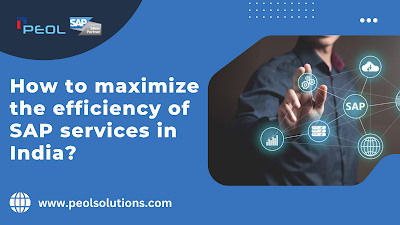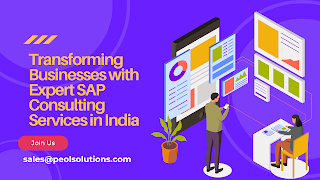How to maximize the efficiency of SAP services in India?
Introduction:
As business operations continue to evolve, enterprises seeking to streamline processes and increase their productivity can benefit greatly from using SAP services in India. SAP, with its latest suite of software solutions, offers a large of opportunities to optimize operations, increase productivity, and stay competitive in the market. However, maximizing the efficiency of SAP services requires strategic planning, careful execution, and a deep understanding of the tools at your disposal. Let’s look into some actionable insights to unlock the full potential of SAP services in India.
Modern Security Measures:
Prioritize modern security measures to safeguard sensitive data, intellectual property, and critical business operations within your SAP environment. Implement multi layered security protocols, encryption mechanisms, and access controls to mitigate cybersecurity threats, comply with regulatory requirements, and maintain data integrity and confidentiality.
Continuous Training and Development:
Recognize that proficiency in SAP services is an ongoing journey. Invest in continuous training and development programs to keep your workforce abreast of the latest updates, features, and best practices within the SAP ecosystem. Encourage employees to pursue certifications, attend workshops, and participate in online forums to deepen their expertise and drive innovation within your organization.
Performance Monitoring and Optimization:
Implement advanced performance monitoring and optimization strategies to proactively identify and address performance bottlenecks, system errors, and capacity constraints within your SAP infrastructure. Leverage monitoring tools, analytics dashboards, and performance benchmarks to gain actionable insights, optimize resource utilization, and ensure optimal system performance under varying workloads and conditions.
Agile Governance Frameworks:
Establish agile governance frameworks to streamline decision-making processes, enforce compliance standards, and align SAP initiatives with overarching business objectives. Foster collaboration between business stakeholders, IT teams, and SAP service providers to prioritize initiatives, allocate resources effectively, and drive measurable outcomes that deliver tangible value to the organization.
Customer-Centric Innovation:
Start a customer-centric approach to innovation by soliciting feedback, conducting user surveys, and engaging customers in co-innovation initiatives to shape the future direction of SAP services. Use design thinking principles, agile methodologies, and rapid prototyping techniques to iterate on ideas, address pain points, and deliver solutions that resonate with end-users and drive customer satisfaction.
Knowledge Sharing and Collaboration:
Foster a culture of knowledge sharing and collaboration across functional teams, departments, and business units to harness collective intelligence, foster cross-pollination of ideas, and drive innovation within the organization. Establish forums, community groups, and knowledge repositories where employees can share insights, troubleshoot problems, and collaborate on projects related to SAP services.
Strategic Vendor Management:
Develop strategic vendor management capabilities to effectively evaluate, negotiate, and manage relationships with SAP service providers, consultants, and technology partners. Conduct thorough due diligence, assess vendor capabilities, and establish clear communication channels to ensure alignment of expectations, delivery of value, and resolution of issues on time.
Business Continuity Planning:
Implement robust business continuity and disaster recovery plans to mitigate risks, minimize downtime, and ensure the resilience of your SAP environment against unforeseen events such as natural disasters, cyberattacks, and system failures. Regularly test contingency plans, backup procedures, and failover mechanisms to validate readiness and enhance the overall reliability and availability of SAP services.
Strategic Roadmap for Innovation:
Develop a strategic roadmap for innovation that outlines key milestones, initiatives, and investments required to drive digital transformation, enhance competitiveness, and future-proof your SAP landscape. Prioritize investments in emerging technologies, industry-specific solutions, and business model innovations that align with your strategic objectives and deliver sustainable value over the long term.
Ecosystem Engagement and Thought Leadership:
Engage actively with the broader SAP ecosystem, including user groups, industry associations, and academic institutions, to exchange ideas, share best practices, and contribute to thought leadership in the field of SAP services. Participate in conferences, seminars, and networking events to stay abreast of industry trends, forge strategic partnerships, and leverage collective expertise to drive innovation and growth.
Conclusion:
Maximizing the efficiency of SAP services in India requires a multifaceted approach encompassing talent development, technological innovation, organizational alignment, and strategic partnerships. By embracing best practices, fostering a culture of innovation, and prioritizing customer-centricity, businesses can unlock new opportunities for growth, competitiveness, and success in the dynamic landscape of digital business transformation.
For More Details:
Call: +91 8217898630
Mail: sales@peolsolutions.com
Visit: https://www.peolsolutions.com




Comments
Post a Comment